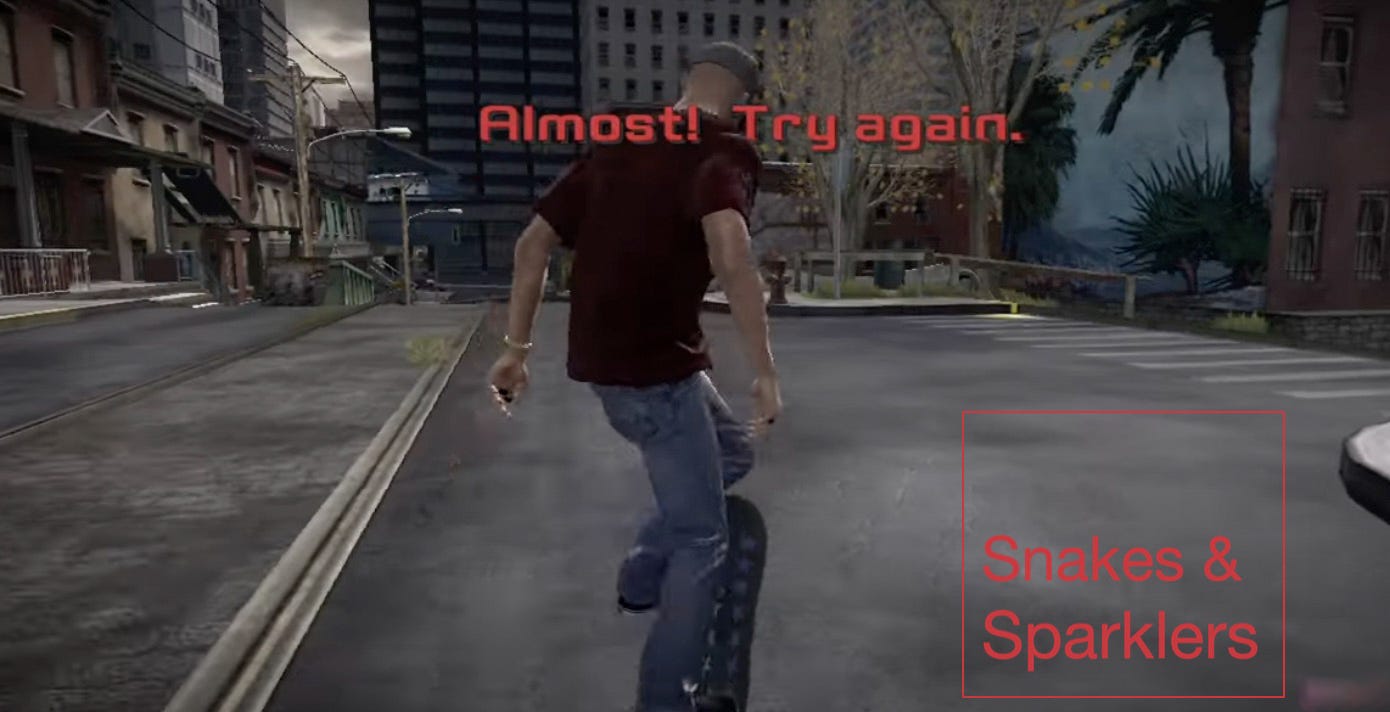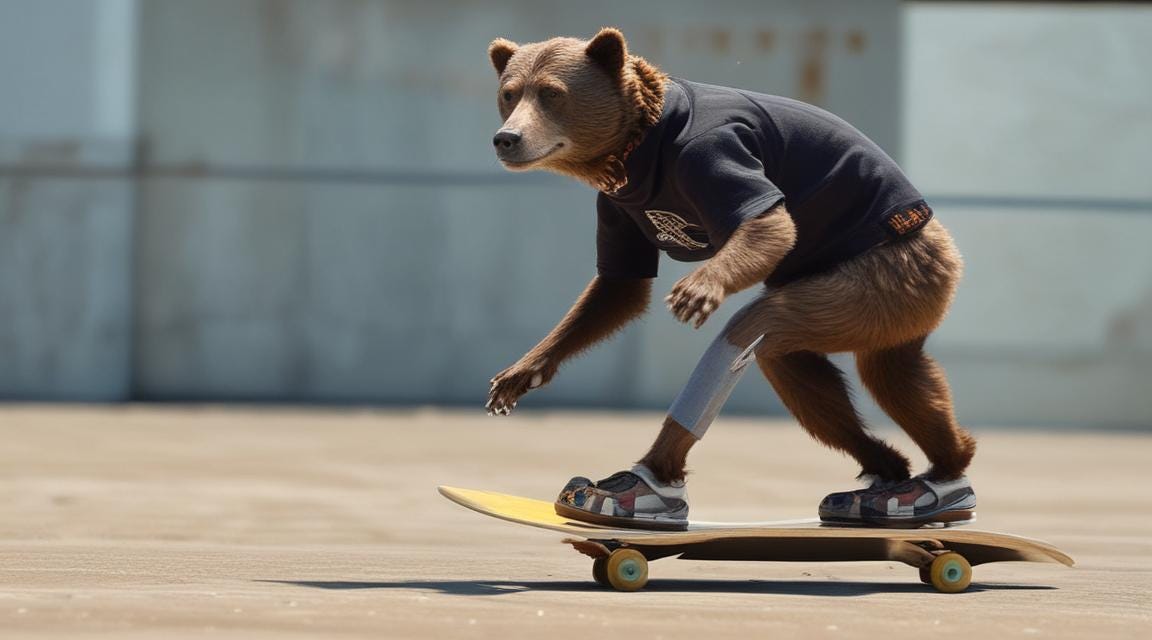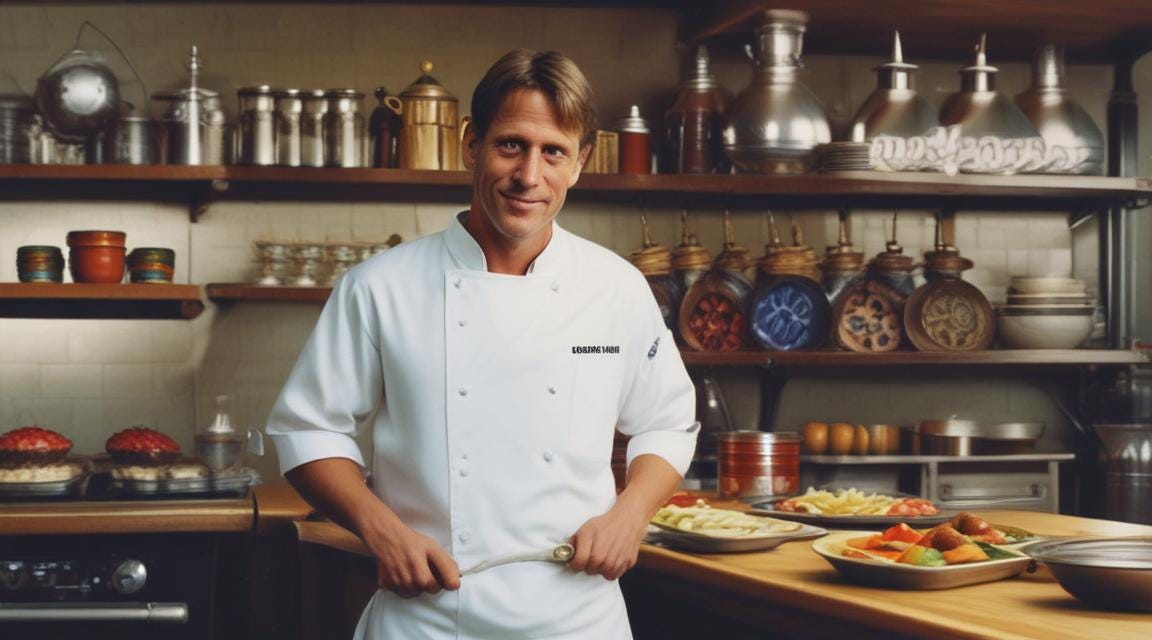The Special Meter Proving Ground: Unrequited Hustle Media (Or 'Choose Your Character Syndrome'
We answered the slacker generation by creating one that thinks your pursuit of happiness needs to be miserable
Welcome to THE SPECIAL METER — a series on the Tony Hawk’s Pro Skater games and the culture surrounding them.
If you missed the first eight releases, you can check them out here:
The Special Meter 2: ‘Ollie the Magic Bum’ and Skateboarding’s Portrayal Problem
The Special Meter 3: Tony Hawk Made Skateboarding So Big that Even 9/11 Couldn’t Take It Away
The Special Meter 4: Last Shot at the Jocks
The Special Meter Underground: You Don’t Pay to Get In, But You Pay to Get Out
The Special Meter Underground 2: Chair Hops and Sit Flips
The Special Meter American Wasteland: History Repeating
The Special Meter Project 8: The Ridiculousness of It All
As always, if this is your first time reading, go ahead and subscribe. There’s only one of these left after this one, so you can rest assured that you won’t just have to read about Tony Hawk video games for much longer. If you like it, share this with a friend!
There are different kinds of Main Character Syndrome.
They’re more specific to the type of self-centeredness one is currently exhibiting. Different generations who absorbed different media latch onto different archetypes to try to feel less alone, to justify their own behavior or shortcomings, and to ultimately believe that there’s some big payoff to everything they’re doing and have done – the happily ever after in some way or another.
There’s “Will Hunting Syndrome,” where someone sees themselves as this put-upon genius of untapped potential if only it weren’t for (somehow simultaneously) every single exterior force and solely themselves. There are guys who have Holden Caulfield Syndrome, where they see themselves as this idiosyncratic and superior being to the phonies (rebranded as basic, NPC’s, etc. over time), and see their social isolation as everyone else’s fault rather than a symptom of their own behavior.
And for 2024, when everyone is watching The Bear, there’s Carmy Berzatto Syndrome – the guy who sees himself as one-track-minded in their pursuit of greatness and perfection at their craft at the expense of almost everything else in their life. The suffer-for-one’s-arter. A lot of the character traits these main character syndromers say they have can be explained by actually just saying they’re an asshole. “I’m sort of too much of a perfectionist.” “I just care too much.” “I just, I just, I just.” No, you’re just an asshole. It’s OK.
The Berzatto guys (and I use that term “guys” generally – it’s not specifically male) aspire for something that might not even be attainable, killing themselves and their relationships in the process, but chalking it up to necessary collateral damage in a war that they probably won’t ever win. Because, if you win, then you’re not that hungry, ambitious character anymore, are you? Relationships and love should be work and you fight for them all the time. Much like the real journey was the friends we made along the way, the real payoff is the endless work and self-punishment.
So, what does this all have to do with a mostly-forgotten, late-stage Tony Hawk game from 2007?
The selection of archetypes, projecting our personalities and our ambitions onto a character or character type, was actually a major part of Tony Hawk’s Proving Ground, which, truthfully, I barely remembered until I started “researching” for this one. I think a lot of us who were fully invested in the series had one foot squarely out the door by this point.
We connect to these archetype characters on TV and movies and books and video games because it’s easy. It’s a personality path already laid out for us and played out to some extent by others. We draw our identities from characters real and fictitious to help us articulate what we feel inside, and we hope that, in the end, we have some sort of moment of redemption or recognition like they do.
Even a skateboarding video game, one deep into its life cycle and already being outsold by another franchise, creates opportunities for people to pull bits of themselves from others and project themselves onto an archetype.
In 2007, millennials were really coming of age. They were moving up to college, entering the workforce, generally getting to an age where your childhood dreams either panned out or they didn’t. You sort of at least knew by then, even the ones like me who were in high school but pre-driving age, that the thing you said you wanted to do as a kid might not happen. Your pipedream was just that. It was around that time, when I was about 15, that I think it finally got through my head that I would not, in fact, be a pro skateboarder. The ship just sailed. Bummer.
Millennials of this age were sort of reacting to what the generation before them had embodied in their teens and early 20s: Slacker culture. Underachieving as a fashion statement. Grunge-era ennui. Nothing hotter than not giving a fuck and rolling your eyes. Hating everything for sport.
Millennials turned hard in the opposite direction, which is why our Instagram algorithms today are filled with hustle culture videos that make us all feel like shit. Movies and TV shows of that mid aughts era loved to show the process, the chase, for ultimate success.
Workplace comedies where the workplace was just a necessary set gave way to work dramedies.
Shows like “Entourage” and “How to Make It In America” glorified the chase of success (as well as casual broish sexism). Like clockwork, when things looked like they were all set to work out, the rug would be pulled out from under the main characters. Vince actually did not get that movie. That big meeting with the designer actually isn’t going to happen.
You are poor and anonymous once again.
That rock isn’t going to push itself up the hill.
Like the anxiety of choosing your major in college (i.e. choosing your career path at the incredibly stupid age of 18), Tony Hawk’s Proving Ground makes you select a type of person (er, skater) you’re going to be. The type of skater you’re going to be unlocks aesthetic details and new challenges/areas that the other types don’t get. In RPG’s, this is just selecting your “class.” The “Career” guys are sponsor-friendly, the “Hardcore” guys have certain true-believer punk rock respect about them.
The whole point of the game is about chasing that skate dream from Underground (down to still competing with Eric Sparrow), and chasing it in the way that is specific to “you,” as long as you fit neatly into three categories of person.
The opening voice-over explains the stakes at play, and explains that the only way to achieve the dream is to suffer, play through the pain, throw on blinders to everything else aside from skateboarding, and you will ultimately get what you want.
A skateboard is more than four wheels and a piece of wood. It can take you somewhere - and I’m not just talking about a destination. Skating can change your life. It all depends on the choices you make.
The skater type descriptions first dangle the carrot:
Career skaters take it to a whole ‘nother level, where a paycheck is on the line. They skate so you know damn well how good they are. And you will know. They fly around the world, get their faces in magazines and on TV, and they get paid to do it. Total rockstars.
Sounds sick. And then assure you that it takes a level of pain and commitment to get there.
The hardcore guys especially relates to The Bear.
Hardcore guys skate for one person only - themselves. They don’t need trophies or fame. They skate til it hurts, and then they skate some more.
It’s no wonder the whole generation is so enamored with “optimization” and sigma content when everything we absorbed growing up told us that the only way to reach our dreams is to suffer and do better every single day.
When Tony Hawk, a guy whose advice I would’ve valued over my own parents at age 15 is telling me that my decisions define who I am, how else am I supposed to grow up except anxious and at times depressed about my own pursuit of increasingly reasonable dreams?
On this latest season of The Bear, Carmy’s deceased brother is talking in a flashback, saying how Carmy is just one of those guys who knows what he wants in life, and is also really good at it. He paints him as effortless at it. Obviously it’s an example of looking at others thinking they have it figured out while their organs are really boiling over in stress and anger. But the viewer can’t help but feel sad about themselves in that moment. At least I did.
By the time you reach adulthood and your goals become more reasonable, you tend to place your eggs in the most effortless basket. The thing that comes most naturally to you. The thing you also like doing the most. Math kids became accountants or actuaries, bullies became cops or high school football coaches, etc.
The skateboarding thing didn’t pan out for me. Writing in some capacity was something that was actually achievable.
But what about when it’s not? What about everyone I went to college with doing much better than me? What about all of the people younger than me doing much better than me? They’re putting out more stuff than me. They’re putting out better stuff than me. There is nothing to do but stick your nose to the grindstone and hustle, and enjoy absolutely none of it. And the thing you felt was easy and fun is now neither of those things. Welcome to the real world, which must, by law, be brutally unforgiving. It’s just how the millennial landscape was drawn.
It really is enough to drive you nuts. I’m not the first to point out the dangers of a social media generation constantly comparing itself to others, or the fact that the promises of a job market were pulled away from us by the time we reached job market age. But there’s a distinct genre of media that we all of a certain age internalized that taught us the only way to live virtuously is to fail almost constantly in pursuit of the thing you want the most, and to never actually get your hands on the dangling carrot. Right when we think we’re there, the carrot gets another inch farther away. But it’s OK, because the characters we’ve grown up with have gone through the same shit week after week on premium cable. It’s not an us problem. It’s just the way the world works.
If you don’t put everything you have and more into your craft, do you even like it?
For years everyone forgot the part in hero’s journey where the hero gets that ultimate boon.
Shows like The Bear or any of these other hustle-at-the-expense-of-your-life legacy shows can do real damage to your brain. I can feel it watching each episode. Yes, it’s edited in a way that’s supposed to induce anxiety like the anxiety you’d feel working in a cutthroat kitchen environment. But also, why is that environment like that in the first place? Because we just decided that guys like Bourdain who romanticized physical pain from cuts and burns and emotional damage from substance/verbal abuse as the necessary par for the course?
I don’t know, man. That’s a conversation for another day or another publication.
But when you’re watching things like this, there’s part of your brain that says, “Yep, that’s right. That’s what I need to do. That’s me up there. That’s me pushing through everything to get [insert goal here], and if I end up with some scars and severed loved ones along the way, that’s just the price of doing business.”
Well, that sucks! And I think it takes a lot of conscious mental work to release yourself from that line of thinking. Detach yourself from the character you relate to whose negative qualities don’t actually get them one step closer to heaven.
As another movie said, choose sitting on that couch watching mind-numbing, spirit-crushing game shows. ‘Cause the game shows aren’t the ones crushing your spirit, I don’t think.
Today’s Snakes and Sparklers musical guest is Bartees Strange
Oh, hey, thanks for scrolling down. The other week, Keanu Reeves was on Tony Hawk’s podcast and, being the normal and nice guy he is, he started asking questions of Tony Hawk, rather than just idly sitting by and passively letting the interview wash over him. They got on the topic of the video games, their soundtracks, and their tastes in music overall, with Reeves asking what Hawk’s favorite band was, developing his taste in music as a kid in Southern California, how his taste in music influenced his choices for the THPS soundtracks, etc.
When I interviewed Tony Hawk for Vice about the Tony Hawk soundtracks, I was so starstruck and nervous that I did a terrible job of asking follow-up questions. Whenever Tony Hawk would allude to getting into a band as a kid, I’d say something like, “Yeah, totally,” and remember I was interviewing my childhood hero, and move on.
That, dear reader, is what we in the journalism business call “shit interviewing.” My editor at Vice for this story, best-selling author Dan Ozzi, emailed me back with edits and said it was, at times, “a bit of a frustrating read,” because I’d get close to these cool moments of diving deep into Tony Hawk’s musical taste and all of that, but just move on. It stung so badly at the time. Clearly, because I 100% guarantee that “a bit of a frustrating read” was verbatim what he said, and this was about six years ago.
This was a writer/editor whose work I admired (100% correctly) telling me my story about someone as important to me as Tony Hawk and his video games and their soundtracks was “frustrating.” Devastating, but, again, Dan was 100% right and, Dan, just in case you’re reading this, I hope you know that I recognized that you were right in the moment. I just couldn’t get Tony Hawk back on the phone, unfortunately.
All of this is to say, Keanu Reeves, stay the fuck in your lane and stop making me look bad.
Still scrolling? Here are some AI-generated images of “Tony Hawk on The Bear” and “Tony Hawk as a chef.”
Now this is what it’s like when world’s collide.





This is one of the best and deepest so far, as someone in the millennial cusp that feels everything you wrote about, Brendan. One thing I'm curious about though, and having not watched The Bear since season 1, is the kitchen culture and mindset specifically.
I'm actually reading Kitchen Confidential right now, and it seems like Anthony Bourdain is in equal parts retelling and romanticizing the culture he grew up in as a chef. All the problems he himself falls into as he gets older are there and festering from the time he gets into the CIA as a young kid.
It makes me wonder how much this self serving grind til you die mindset existed before becoming the mainstream millennial zeitgeist, and how much it is something that was permeated throughout our culture by the media we consumed. Maybe Anthony Bourdain could've become a figure of change in the culinary world, but he was a bit too self-destructive. Is our generation the same way? Great read.